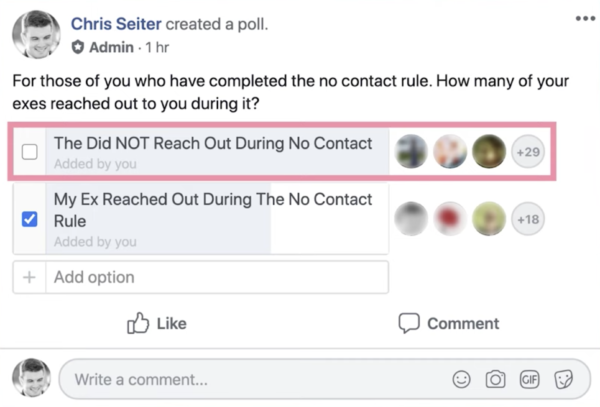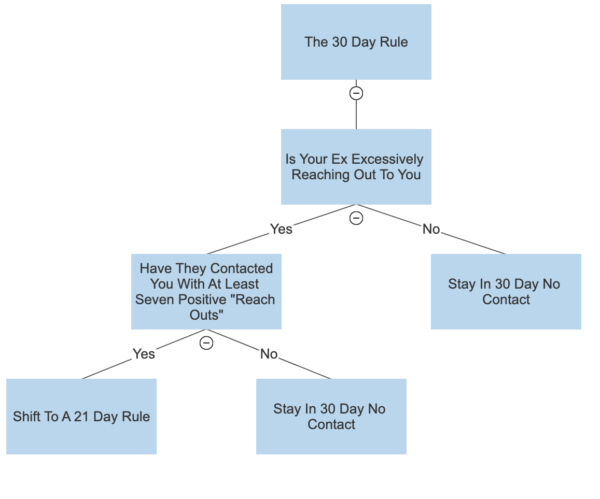Today we’re going to be talking about how long you should stay silent after a breakup.
Specifically, I’d like to talk about the three following things.
- Understanding The Purpose Of A No Contact Rule
- My New Twist On The No Contact Rule Time Frames
- Navigating The Dismissive Avoidant Stages During A No Contact
Now, if you’re a veteran of the website some of this information may seem repetitive but I assure you I’m adding a new twist to it so I’d encourage you to pay attention.
Let’s begin.

What Are Your Chances of Getting Your Ex Boyfriend Back?
Take the quizUnderstanding The Purpose Of A No Contact Rule
Generally when someone asks me about silence they’re usually inquiring about the no contact rule which I’ve written many articles about and filmed many videos on,
For those who aren’t familiar with our way of things here’s our official definition of the no contact rule,
The no contact rule refers to a period of time where you cut off all conceivable communication with an ex after a breakup. The intent of this tactic should NOT be used to make your ex miss you but instead should be used to rebuild your own life so that you outgrow your ex. By doing this, the no contact rule can have the added benefit of making an ex miss you
So that should do it, right?
You should stay silent after a breakup for however long the no contact rule is for, right?
Well…
Before I answer that I’d like to show you some research. Now, most of the people that enter our orbit and engage in a no contact rule do so because they believe that it will help make their ex want them back.
Usually they gauge this by having the expectation that an ex will reach out to them during no contact.
About that…
Last year on a whim I decided to look into how often you could expect this to happen. The results weren’t great,
Turns out that the majority of people who use a no contact rule on their ex won’t see any type of reach out from an ex at all.
We think this is because the vast majority of our clients have exes who are avoidant so of course they’re not going to reach out first.
But this brings up a fundamental issue with silence after a breakup. Often people value silence only because of its function to create desire within an ex.
The thinking is simple, if I’m silent my ex will miss me and want to come back or re-live some of the top tier moments from the relationship.
Here’s the problem.
When you actually interview success stories we’re finding that people who go into a no contact rule/silent period with that intent never end up getting the desired result.

What Are Your Chances of Getting Your Ex Boyfriend Back?
Take the quizWhy?
Well, let’s look at the time frames to gain a better understanding.
My New Twist On The No Contact Rule Time Frames
I’m about to say something extremely controversial. Something that will fly in the face of what I’ve recommended in the past.
It doesn’t have to as it’s more of an intent issue but more on that in a second.
Let’s stick to the basics.
Generally speaking we recommend three distinct no contact rule time frames.
- A 21 Day Rule
- A 30 Day Rule
- A 45 Day Rule
Which reigns supreme. Well, that’s a complicated issue as everyone’s situation is wholly unique and as a result different no contact time frames are required.
Here’s our general rule though,
Always start with a 30 day rule and alter it as you go. If your ex is excessively reaching out to you during that no contact time frame them you can alter it to a 21 day rule.
If they aren’t and you feel like you need more time shift it to a 45 day rule.
That’s what I thought years ago and for the most part that advice still works but my mind has been changed a bit.
In 2020 we really started to research our success stories pretty heavily and looking for commonalities among them.
We found some interesting insights.
- Most of our success stories have some type of fear of loss element
- Most of our success stories got to this point emotionally where they weren’t sure they want their ex back anymore.
It’s that second insight that I think is the most powerful when it comes to silence.
Most people assume that if you are silent your ex will take that as you moving on and therefore they’ll miss you but it’s more complicated.
We’ve seen the difference between someone who authentically wanted to move on as opposed to someone who pretended like they did.
The results are clear. Literally trying to move on is the best strategy for not only getting over an ex but getting them back as well.
And here’s the point I’d like to argue.
I think the most important thing about no contact is that you shouldn’t break it unless you’ve gotten to this place emotionally which lends itself to longer periods of no contact.
That’s why if you look at the official definition I put above the word “outgrowing” is there.
But why does this work?
Understanding How “Dismissive Avoidant” Stages Play Into Your Silent Time
If you haven’t ready my pretty great article with Tyler Ramsey then I suggest you check it out here.

What Are Your Chances of Getting Your Ex Boyfriend Back?
Take the quizIn it we basically go through five major stages that dismissive avoidants go through post breakup,
- Avoiding all things about that person
- Feelings beginning to bubble to the surface
- Re-suppression
- Beginning to move on
- Nostalgia
In an article I wrote yesterday I lovingly referred to these stages as a pogo sticking because literally an avoidant will jump back and forth between them often.
Why is this important for determining how long you should stay silent after a breakup?
Well, by simply understanding how avoidants operate you’ll gain insight into the following.
- You’ll understand why we’re finding most exes aren’t reaching out during no contact
- You’ll understand why exes often don’t consider getting back together until nostalgia hits.
Let’s tackle that first insight.
Why We Think Most Exes Aren’t Reaching Out During No Contact
Take a look at that first stage with avoidants.
What does it say?
“Avoiding all things about their ex.”
Often when we’re advising people to use a no contact rule they’re literally using it during this stage of the avoidant grieving process. Of course, they come into the no contact rule with unrealistic expectations.
They see all these stories of successful no contact rules where an ex blew up one of our clients phones and in some cases immediately begged for them back.
“That could be me.” They’ll think but often those are the rare cases. Often we find exes won’t be reaching out at all during no contact which just proves what I’m saying about your intentions during no contact being all the more important.
Silence shouldn’t be used at all for an ex, it should be used for yourself.
Which is a seamless lead in to the next point I’d like to make.
Understanding Nostalgic Reverie
Do yourself a favor and watch this video,
It might be one of my favorite ones I’ve ever filmed because some of the insights I talk about learning there have been a through line for me in understanding how exes operate.
With avoidants one of the things we’ve learned is that they usually don’t consider “coming back” until nostalgic reverie hits.
Here’s the irony, if you know anything about avoidants then you’ll know that they are often marked by the paradox of wanting love not not letting anyone close enough to give them that love.
The presents an interesting problem for our clients. How then can you get close enough to attract them back to you?
Well, I found this interesting snippet from a really great little website called, Free to Attach about something called the Phantom Ex Syndrome,
The phantom ex operates because there is/was distance, not because the relationship was successful. But a fixation with a past partner affects budding new relationships, blocking them from getting close to someone else.
The avoidant is often drawn to a partner that they can fawn over but not get close enough to commit to.

What Are Your Chances of Getting Your Ex Boyfriend Back?
Take the quizWhich explains the nostalgic reverie component. Often nostalgia doesn’t kick in until an ex feels like you’ve moved past them which also explains why the success stories we’ve interviewed all cite “moving on” during no contact as something they did.
What I think is happening is they go into no contact with the correct intent, moving on, they begin the process of doing so which in turn kicks up the nostalgia within the avoidant who all of a sudden wants to try again.
The Sad Truth Of Getting An Avoidant Ex Back
I’m proud of the work I’ve done here on Ex Boyfriend Recovery. I feel like I’ve done my best to come up with a successful strategy that is repeatable and works.
But that doesn’t mean the strategy is free from flaws.
Yep, I’m more than willing to talk about the biggest black eye I can think of.
Half of the couples we help get back together break up again.
What does that mean?
Simply put, one or both parties continue the behaviors that caused the original breakup in the first place. In an effort to combat this I’ve been trying to educate my clients on attachment styles and their importance for having a healthy and happy relationship.
If we can help our clients exhibit more secure behaviors in a relationship one of two things will happen,
They’ll find someone else that they’ll be happier with because they see that their ex wasn’t the right one for them (definitely a win)
Or
They’ll lead by example. Slowly but surely the ex will recognize what a secure relationship is supposed to look like and their relationship will improve. (Another definite win)


Kay
March 26, 2022 at 6:52 pm
I have a quick question about the No Contact Rule. After reading through, I decided I will wait 30 days to exchange the stuff we have at each other’s houses (instead of trying to do it right away). My question is about a couple of streaming services (that I pay for) that I gave him access to. Should I leave his access intact during No Contact? What message does that send versus what message would it send if I were to change my password/revoke his access? Which is better if I want a chance of getting back together?
EBR Team Member: Shaunna
April 10, 2022 at 3:00 pm
Hi Kay, so I would suggest that you decide if you are happy for him to use these devices if you do not get back together in the future. I would suggest that you see how things go through the texting phase but make sure that when you reach out that you do not go straight into a conversation about exchanging your belongings, you need to go into a conversation that is short and light so there is no pressure on him to get emotional or bring up the past.